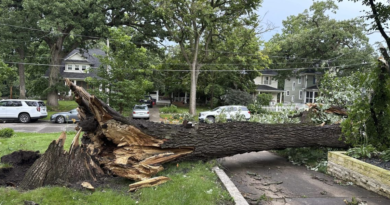The mental health paradox: Amid the loneliness epidemic, most say they need alone time to feel better this holiday season
As you’ll surely hear Andy Williams croon in the coming weeks, it’s the most wonderful time of the year. For some holiday revelers, that is. But for others, no matter what traditions they plan to observe this winter, the season is more of a stress fest.
The majority of Americans (56%) say adequate alone time is a critical component of their mental health—yet nearly half (46%) don’t get it during the winter holidays. That’s according to a new survey from the Ohio State University Wexner Medical Center and College of Medicine, the findings of which were published Dec. 3.
Carving out alone time for yourself, however fleetingly, can bear both mental and physical benefits, according to Sophie Lazarus, PhD, an Ohio State clinical psychologist who specializes in mood and anxiety disorders, as well as mindfulness-based interventions.
“By taking a brief pause alone, our nervous system can settle, our mind can settle, our body can settle,” Lazarus said in a news release about the survey. “And I think that can be important. We know that chronic stress is not good for us.”
Ohio State polled more than 1,000 U.S. adults in October, who were asked whether they agreed with the following statements:
- I wish I was able to get more alone time for myself: 43%
- It is very important to my mental health to have adequate alone time: 56%
- I get less alone time around the holidays: 46%
- I’m more irritable because I don’t get enough alone time: 36%
Men (47%) and women (45%) were about equally likely to say they get less alone time during the holidays. People 65 and older (38%) were least likely to say the same, with younger age groups ranging from 47% to 49%. When considering annual household income, those who bring in $50,000 to $74,999 were least likely (31%) to indicate less holiday alone time; respondents in higher and lower income brackets ranged from 42% to 50%. People of color (50%) were more likely than white respondents (43%) to report inadequate alone time during the holidays.
Throughout this season of giving, it’s OK to present yourself with the gift of solitude, Lazarus said.
“I think it’s important to remember that just because you’re prioritizing yourself at this moment doesn’t mean that you’re selfish and doesn’t mean that you always make the choice to prioritize yourself over others.”
U.S. loneliness epidemic persists
The Ohio State survey comes as the nation grapples with a loneliness epidemic. Last year, Surgeon General Dr. Vivek Murthy declared the problem a public health crisis, with his office stressing that a lack of social connection increases one’s risk of premature death by more than 60%.
“Our relationships are a source of healing and well-being hiding in plain sight—one that can help us live healthier, more fulfilled, and more productive lives,” Murthy said in a May 2023 statement. “Given the significant health consequences of loneliness and isolation, we must prioritize building social connection the same way we have prioritized other critical public health issues such as tobacco, obesity, and substance use disorders. Together, we can build a country that’s healthier, more resilient, less lonely, and more connected.”
However, whereas loneliness may be accompanied by feelings of sadness and abandonment, solitude indicates a contented choice to be by oneself. If you prefer, you don’t have to physically be alone to enjoy alone time, Lazarus said.
“Some people might experience alone time from going to a movie by themselves or going to a park where there’s a lot of people, or going to a coffee shop,” Lazarus said. “It can also be this absence of having to perform or interact socially in a more direct way.”
Psychologist’s tips for carving out holiday alone time
If your holiday schedule is jam-packed, remember that carving out time for yourself doesn’t necessarily require a large chunk of time or effort, Lazarus said. Keep it simple when adding alone time to your routine.
“Try putting your phone in a totally different room when you decide you’re going to spend alone time, knowing how hard it is to resist picking it up, the pulls on our attention and on our priorities,” Lazarus said. “Or, take two or three minutes in the car before you go pick your kids up or before you go back into the house after work to just be alone.”
She added, “One size doesn’t fit everyone. Being flexible and finding a balance is best.”
In addition, the Centers for Disease Control and Prevention offers these tips for managing stress:
- Take five. Take a deep breath and relax. Even five minutes to take care of yourself can help.
- Be active. Take a walk, stretch, or find another physical activity that works for you.
- Connect with others. Reach out to friends and family.
- Stick to a daily routine that includes rest, exercise, and eating healthy.
- Seek support from friends, family, and trusted organizations. Talk about your feelings with others. Reach out to clergy or others in your faith community.
- Get help from a professional. Talk to a health care provider about how you are feeling.
If you need immediate mental health support, contact the 988 Suicide & Crisis Lifeline.
For more on stress and loneliness:
Subscribe to Well Adjusted, our newsletter full of simple strategies to work smarter and live better, from the Fortune Well team. Sign up for free today.




